Hearings of the
Subcommittee on Rules and Organization of the House
Proposals Emanating from the Second Bipartisan Congressional Retreat
A DIGEST OF MATERIALS PREPARED BY THE ANNENBERG PUBLIC POLICY CENTER OF THE UNIVERSITY OF PENNSYLVANIA FOR HERSHEY I AND II
By Kathleen Hall Jamieson, Dean of the Annenberg School for Communication of the University of Pennsylvania and Director of the Annenberg Public Policy Center, and Annenberg doctoral student Erika Falk. The work was funded by a grant from The Pew Charitable Trusts.
April 1999
From March 7-9, 1997, 200 Members of the House of Representatives, 165 spouses and 100 of their children attended a bipartisan retreat in Hershey, Pennsylvania coordinated by The Aspen Institute and funded by a grant from The Pew Charitable Trusts. The retreat was organized by the Bipartisan Congressional Planning Committee, co-chaired by Congressmen David Skaggs (CO) and Ray LaHood (IL). The committee included Members: Rep. Eva Clayton (NC), Rep. David Dreier (CA), Rep. Jo Ann Emerson (MO), Rep. Tillie Fowler (FL), Rep. Ruben Hinojosa (TX), Rep. Amo Houghton (NY), Rep. Tom Sawyer (OH), Rep. Charlie Stenholm (TX).
According to its organizers, the retreat was designed, "To seek a greater degree of civility, mutual respect and, when possible, bipartisanship among Members of the House of Representatives in order to foster an environment in which vigorous debate and mutual respect can coexist."
Even before the Hershey Retreat occurred, rhetoric on the floor of Congress suggested that plans for the Retreat were having an impact. After the Retreat, Speaker Gingrich hoped that the Hershey experience would "begin to set this House back on a track of working together, of getting things done, of recognizing we may have deep differences at times but there are other times when we have many, many things that bring us together…." House Minority leader Gephardt pledged "our best efforts to carry the spirit of that meeting forward with tangible results in trying to work together better in a variety of ways."
After the retreat, references on the floor to Hershey by Members of Congress served to:
Remind Members that civility is a norm:
- "We continue to recognize that there will be deep, passionate policy differences between the parties. I think today's debate on the House resolution was a classic example, and we have no desire to blur those distinctions. Conflict in Congress is unavoidable, and the nation is well-served by healthy and vigorous debate.… The retreat, rather, was about handling those disagreements constructively and honoring our democracy with debates that are more civil, more respectful and, ultimately, more productive…."
Invite reflection on the content or tone of debate:
- X: "I did not go to Hershey, PA at the bipartisan retreat, but if I had and would have come on
the floor for this debate this evening, I do not believe I would have used words like 'absurd,'
'mush,' things of that sort.… I do not think they help us."
Y: "If I said anything that is personal to the gentleman, I apologize. I was characterizing the ideas that are in debate…."
X: "My good friend from Y meant nothing personal toward me, nor did I take it as such.…"
Personalize floor statements:
- "Why is balancing the budget so important? Why should we care whether we pile up more debt on future generations? …at our bipartisan retreat… a lot of Members in both parties brought their children. The place was overflowing with kids. It was so much fun to see these kids having a good time. We are balancing the budget for their sake."
Call for compromise:
- "The compromise that I have proposed in the spirit of this bipartisan Congress is that…we had a bipartisan retreat, and part of the retreat's purpose was to see to it that we work together in a more civil manner.…"
Remind Members of the meaning of the Hershey experience:
- "This particular retreat gave us for the first time in a long time a chance for us to meet on a
personal level…."
"The Chair would require all Members to be respectful of each other anywhere on the floor. Hershey was only 3 weeks ago."
Establish common ground:
- "I think it might not be necessarily easier for Republicans to kiss a Democrat or for a Democrat to kiss a Republican, but it will be easier for us all to give each other a Hershey kiss."
Provide comic relief:
- X: "The gentleman is doing real well for a new guy."
Y: "The gentleman is, too, and I like his hair in the spirit of Hershey and comity."
X: "I thank the gentleman."
Allusions to the Hershey experience occurred in debates on balancing the budget, health care for children, EPA policies, Social Security, and campaign finance reform.
***
In Congress, comity is based on the norm of reciprocal courtesy and presupposes that the differences between Members and parties are philosophical not personal, that parties to a debate are entitled to the presumption that their views are legitimate even if not correct, and that those on all sides are persons of good will and integrity motivated by conviction.
Strong partisanship and civility are not mutually exclusive. Pleas for civility are not calls for blurring partisan differences. As a result, a measure of partisanship is separated from measures of incivility.
The value of comity is evident in the fact that members praise the civility of those they honor:
- "Lee [Hamilton], your departure will create an enormous need in this House to replace the kind of civility, wise balance, and professionalism with which your presence has always been marked."
"Mr. Speaker, on May 8 this year, the nation lost a great man, a former U.S. Senator, a beloved West Virginian, a great orator, a man of civility and courtesy, a master of legislative compromise, a builder of concrete, asphalt and stone, and builder of character named Jennings Randolph, who died at the grand old age of 96."
FINDINGS
This report compares the 105th Congress to those that preceded it. Since no comparable debate occurred in the earlier sessions that we studied, we have separated the impeachment debate of December 17-19, 1998 from the rest of the second session of the 105th. On charts, that debate is identified by the number of the resolution being debated, 611.
NON-PROCEDURAL (WORD USE) MEASURES:
1. Until the debate on Res. 611, the 105th Congress had been more civil than the first session of the l04th.
The Dec 17-19 debate on impeachment:
pushed our measure of partisanship (i.e., non-cooperation) significantly above the rates for all of the earlier sessions that we studied;
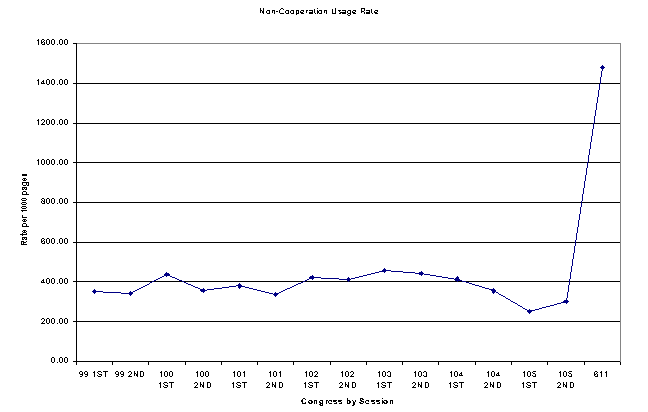
raised the level of name calling and vulgarity to the level of the first session of the 104th;
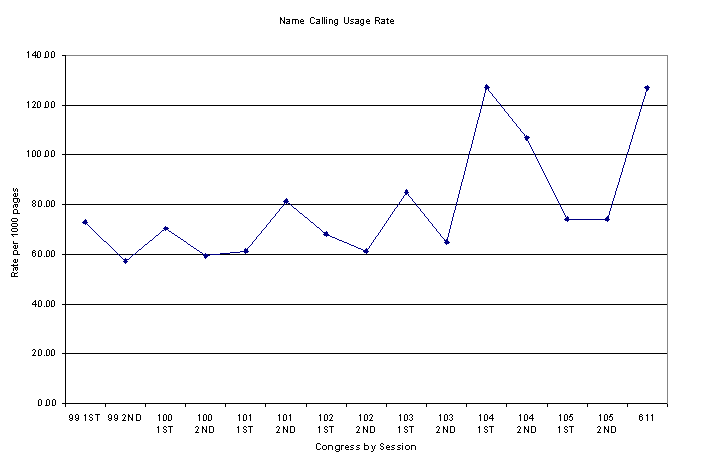
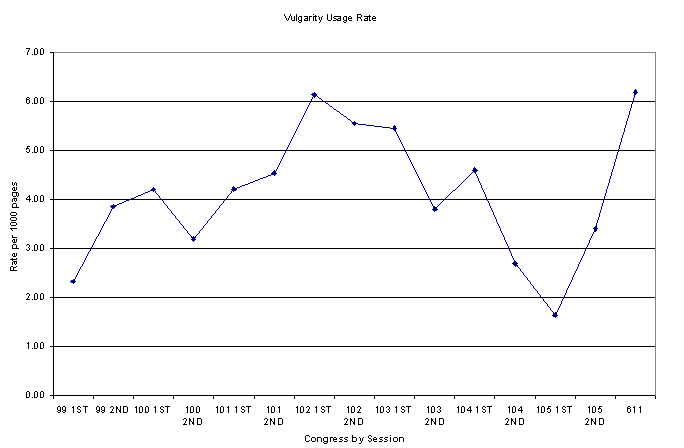
moved our measure of aspersion to its high point in our study, (Since this index includes such words as "reckless," one might argue that the increase was driven in part by widely shared characterizations of the President's behavior.);
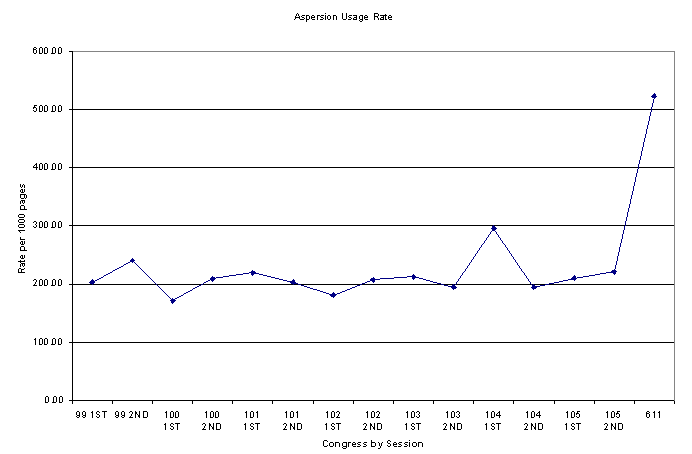
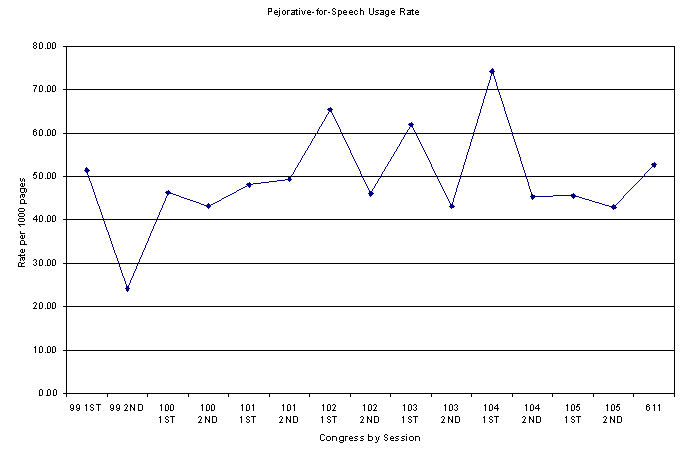
Since the impeachment debate focused in part on whether the president had lied under oath, we have not calculated synonyms for lie or lying for the impeachment debate.
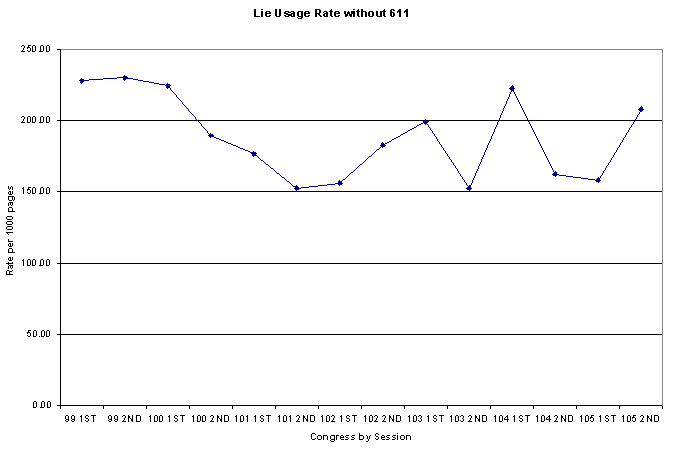
2. In general our non-procedural indices (i.e., name calling, vulgarity, aspersion, pejoratives for speech, synonyms for lying) suggest that, contrary to the norm of past Congresses, the second session of the 105th was less civil than the first. Our non-cooperation index suggests that the second session was more partisan, as well.
PROCEDURAL MEASURES:
3. However, by our procedural measures (i.e., requests to take down, words taken down, words taken down that go to a ruling by the chair) the second session of the 105th was more civil than the first.
- There were fewer requests to take down words in the second session of the 105th than in the first. In the second session there were 3 requests compared to 9 in the first. This is a substantial improvement over the first session of the 104th Congress in which there were 19 requests. The average number of requests for the years in our study is 3 per year.
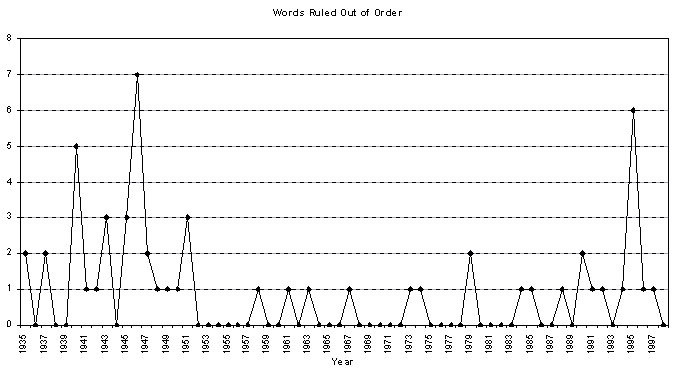
- There were also fewer words ruled out of order in the second session of the 105th. In the second session no words were ruled out of order, compared to one in the first, and six in the first session of the 104th. The median for the years in our study is about 1 occasion/year.
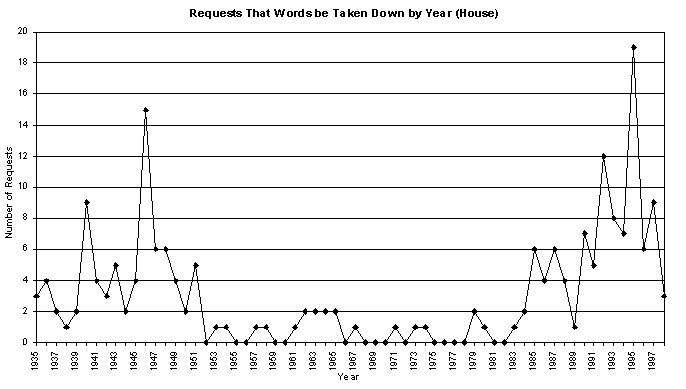
PRODUCTIVITY AND CIVILITY GO HAND-IN-HAND:
4. As name calling rises, productivity falls. The Name Calling rate correlates inversely with the passage of measures (r=.62).
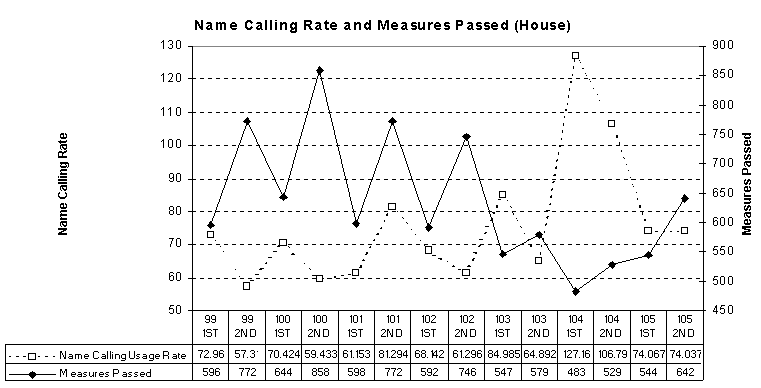
5. Name calling also correlates inversely with the number of joint resolutions passed. Over the last seven Congresses more name calling corresponded with fewer joint resolutions. The two measures were correlated at (r=.63).
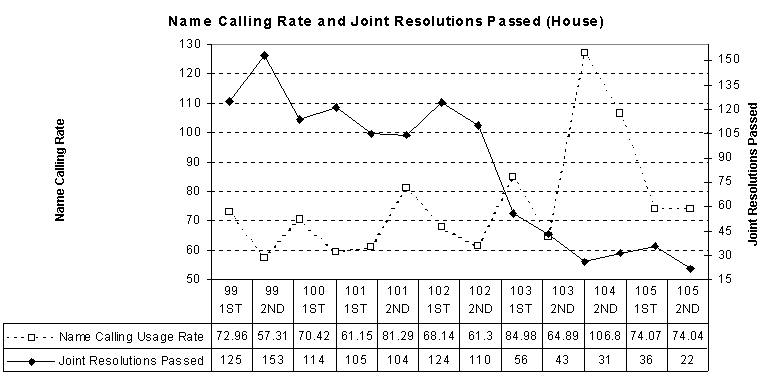
6. Name calling goes up with increased hours in session (r=.83). Fatigue is a possible explanation. Alternatively the long hours may reflect an inability to find consensus. Or, less civility may necessitate longer hours to get work done.
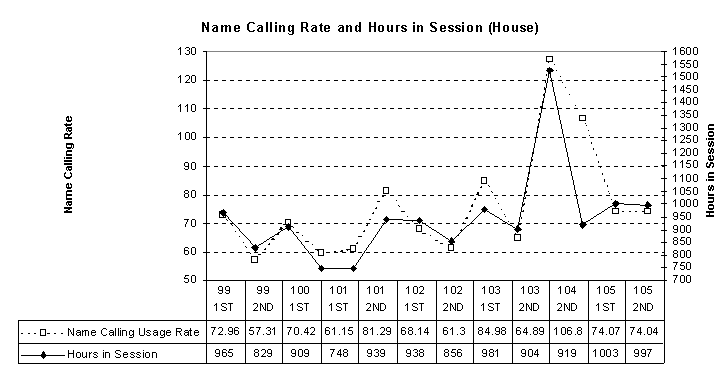
SIGNS OF COMITY NOT CAPTURED BY OUR NUMERICAL MEASURES
Where in the first session of the 104th, Members were quick to move to the taking down process, in the 105th the initiation of that process was more likely to de-escalate than escalate tension. Note the references to the spirit of civility and to the Hershey retreat.
- X: "Mr. Speaker, I regret to ask that the gentlewoman's words be taken down. She just
issued a false statement."
Y: "Mr. Speaker, I will be happy to withdraw the request in the spirit of civility."
-
X: "I ask that the gentleman's words be taken down…."
Y: "I ask unanimous consent to withdraw my words about specifically mentioning the President...."
X: "Mr. Speaker, I thank the gentleman for making the correction and that saves us a trip back to Hershey."
On a number of instances in the 105th, Members found a means short of procedural intervention to modulate the debate:
- X "I rise to a point of order."
Speaker: "The gentleman will state his point of order."
X: "Mr. Speaker, I would inquire of the Chair whether an accusation of obstruction of justice is permitted on the House floor."
Speaker: "The reference to obstruction of justice should not be made with respect to specific or certain Members of the House of Representatives."
X "Mr. Speaker, with the permission of the gentleman, I will withdraw the remark, to the extent that it conveys violation of stature. I do not mean to suggest that. What I mean to suggest very explicitly is that the minority is obstructing what the Justice Department itself wishes to do."
THE FIRST SESSION
Comparing the discourse surrounding controversial events in the first session of the 105th with parallel events in past Congresses suggests that Members of both parties showed restraint in the 105th.
- The discourse surrounding ethics charges against Speaker Gingrich in the first session of the 105th was more civil than that surrounding ethics charges against Speaker Wright.
-
The discussion about determination of the victor in the California's 46th Congressional District in the first session of the 105th was more civil than that surrounding the decision involving the seating of Democrat Frank McCloskey rather than Republican Richard McIntyre in a close and disputed election in the 8th Congressional District of Indiana in 1984.
The process of banning a former member from the floor was handled with diplomacy and decorum
The resolution banning a former Member from the Chamber after an uncivil outburst was
supported by the leadership of the party to which he belonged. Two hundred eighty nine
Members voted to bar that Member from the Capitol sanctuary until his challenge to the outcome
of the election in his district was resolved. One hundred eleven of those were Members of the
offending former Member's party. That session was chaired by the Speaker of the House -- also
a Member of the former Member's party. The process took place without eliciting the sorts of
rancorous exchanges that had characterized tense moments in the first session of the 104th.
THE SECOND SESSION
Both Republicans and Democrats mourned the deaths of officers Chestnut and Gibson. In his eulogy of Officer Chestnut, Pastor Marcom noted the change the tragedy had produced in the relations among Members in the House. He also said that he suspected that the change would be short-lived. When that prophesy proved accurate, a Member noted that:
"In the aftermath of this tragedy and the heartfelt sympathy of the American people, we in this body were briefly changed. We came together as one family to pay our respects, to reflect on the almost surreal tragedy of that July afternoon and, for a time, respect, civility and comity ruled the day…we are too much like a caricature of ourselves and too little like Officers Jacob Chestnut and John Gibson. We are too much like adversaries and too little like we were in the days after the gun fire erupted in the Capitol."
THE DEBATE ON HOUSE RESOLUTION 611
The impeachment debate in the House created the most tense and most partisan moments of the 105th Congress. As we noted earlier, the partisanship of that debate is reflected in a spike in our measure of the language of non-cooperation. An increase in incivility is captured most clearly in our measure of name calling.
At the opening of the debate, the speaker read an announcement that reiterated points made "with the concurrence of the minority leader on September 10, 1998 during the pendency of proceedings in the impeachment…." The announcement cited precedents for the conclusion that "While a wide range of discussion is permitted during debate, Clause 1 of Rule 14 still prohibits the use of language which is personally abusive…" The announcement concluded with the reminder that "While the impeachment matter is pending on the floor, the chair would remind Members that although the personal conduct of the president is at issue, the rules prohibit Members from engaging in generally personal, abusive language toward the President and also from engaging in comparisons to personal conduct of sitting members of either House of Congress." (The comment about "comparisons to personal conduct of sitting members" elicited groans from some in the Chamber.) Throughout the House debate, the Speaker pro tempore maintained a disinterested nonpartisan tone. His handling of the role was widely praised.
Moreover, one of the more volatile moments in the debate, the exchanges on the move by Democrats to secure a vote on censure, was civil. When Democrats attempted to secure the option to censure, the subsequent debate over the point of order on the motion to recommit was carefully reasoned, thoughtfully documented, and free of vitriol. A moment that could have marked the low point of the debate instead became a high point. The ruling of the chair, which had been anticipated by Democrats, was accepted without rhetorical bloodshed.
Instead of initiating requests to take down during rancorous moments, members instead used less confrontational parliamentary alternatives. For example, one member asked, "Mr. Speaker, is the word hypocrisy in order on this floor?" Instead of initiating parliamentary intervention, another noted "I must say I am very saddened to report, Mr. Speaker, I have been listening to several speakers, and that I have seen frankly quite caustic and harsh characterizations of the motives of the Members…[W]ould it be appropriate, Mr. Speaker, for me to ask on behalf of the dignity of the Chamber to exercise the authority of the Chair to remind Members of these protocols and respects, and perhaps if necessary enforce them so that we on this side may not find ourselves compelled to raise it as a point on the floor during the debate…"
METHODOLOGY
This section explains how we arrived at our conclusions.
Requests and rulings that words be taken down:
For the years 1935 -- 1984 requests that words be taken down were calculated by copying the
reports on words taken down from the House Journal appendices and checking them against
reports by Ilona Nickels for the Congressional Research Service, and by Republican leader Bob
Michel. For the years 1984 -- 1998 requests that words be taken down were calculated by
searching an electronic database of the Congressional Record for "take" in the same sentence as
"down." A researcher then examined each case to verify its relevance. The counts for the years
before 1985 only include requests that resulted in a ruling and not times when the words were
withdrawn, the demand was withdrawn, the demand was too late, or a caution was given by the
chair.
Word Rates:
Because the length of congressional sessions varies, all word counts are reported in rates (i.e., the
number of times the words appear per 1000 pages in the Congressional Record). Our word list
was generated by coding words actually used in a session of Congress into two categories:
uncivil and other. This process produced a list of over 400 words that might indicate incivility.
These words were then sorted into several categories by four different coders. Only those
categorized in the same way by at least three coders were used. This resulted in 294 words in
seven categories. Six of these categories measure incivility. One (non-cooperation) is a measure
of partisanship.
Incivility
- Name Calling: 92 nouns -- such as weirdo, traitor, crack pot, and bitch.
- Aspersions: 71 words that insult but do not call names -- such as irrational, reckless, and un-American.
- Synonyms For Lie: 58 words for lying or a person who lies -- such as hoax, farce, and
prevaricate.
- Pejorative Words for Speech: 19 words used to derogate speech -- such as bellyache, double
speak, and gibberish.
- Vulgarity: 11 taboo words -- such as, damn, shit, and hell.
Partisanship
- 6. Non-cooperation: 28 words indicating non-cooperation -- such as polarized, filibuster, inflexible.
Each word was then searched in an electronic database. The totals where summed by index and
session of Congress. The index total for each session was then divided by the number of pages
in the Congressional Record for that session and multiplied by a factor of 1,000. This resulted in
a word rate that measured the number of times the words in the each index were used per 1,000
pages of the Congressional Record.
Note:
Because they are decontextualized, the word counts tend to overestimate actual incidents of incivility. For example, "you are a liar" is counted the same as "you are not a liar."
RECOMMENDATIONS CONTAINED IN BACKGROUND REPORT PREPARED FOR THE FIRST HERSHEY RETREAT HELD IN MARCH
Changing the record
1. Adopt the model of the court system, providing descriptions of visual aids in the Record. This would permit the Parliamentarian's Office to develop a list of precedents governing visual materials.
2. Record efforts to gavel down a Member. Often, what appear to be inconsistent exercises of parliamentary authority would appear less so if the Record showed that the inappropriate
behavior was being gavelled down. If this change is made, it would be important to note when
the Chair is gavelling to quiet the gallery rather than the floor.
Changing the rules
1. Encourage more parliamentary intervention against unparliamentary language during Special Orders. Change the rules to say that appeals of the decision of the Chair made after regular business hours will be taken under consideration to be voted on at a specified time on the next legislative day. In the meantime, the Member whose words have been taken down will retain the right to speak for the rest of the day. After the vote on the appeal from the ruling of the Chair, if the Chair's ruling is sustained, permission would be required for the Member to proceed in order for that day.
2. When a Member uses unparliamentary language, the words are taken down, stricken from the record and the Member requires permission to regain speaking privileges for the day. There
should be some comparable form of penalty for a Member who threatens another Member with
violence or engages in an act of violence on the floor, in areas adjacent to the floor, or in
committee meetings.
Creating a culture conducive to comity
1. When a Member is named, questioned, or referred to by another and requests the opportunity to respond, he or she should be yielded to for response. When a Member plans to criticize another Member on the floor during Special Orders, he or she should as a courtesy notify that Member. In the past, individuals of both parties have assumed that they should be granted these courtesies. For example: "Will the gentleman yield to me since he has mentioned my name?"(1) "Will the gentleman yield now? He has mentioned my name for a third time."(2) "Mr. Speaker, I had thought the gentleman had asked me questions and was going to provide 5 seconds for me to respond."(3)
2. When one side has yielded to the other, it is courteous to reciprocate when one holds floor.(4)
3. When a Member refuses to yield, requests to yield should cease.
4. Words being withdrawn should not be repeated.
5. When a Member indicates a willingness to apologize, the apology should be accepted.
Changing practice
Increase party vigilance
1. Members have functioned as parliamentary watchdogs in the past (e.g., Representatives Walker and Volkmer). They have acted aggressively to protect the rights of their party and of its Members. Indeed, when Representative Walker retired, he was eulogized by one of his colleagues on the grounds that "For years he served his party, this institution and the country by challenging procedure and process to ensure that the minority voice and opinion would be heard."(5)
The parties might assign Members of comparable skill to restrain the inappropriate tendencies of their own party. These individuals would be tasked with calming the Members and their speech before it oversteps the line, securing recognition to urge a change in the tone of debate-and would move to take their own Member's words down if they were unparliamentary. An initiative of this sort is already underway. A group consisting of the Blue Dog Republicans and the Blue Dog Coalition has offered Members a civility pledge and agreed, among other things, that "We will rise occasionally when the debate gets too heated and try to calm things down."(6)
Members have informally performed this role in the past. As a result, a Member who had occasionally overstepped the parliamentary line noted when yielded three minutes during debate over a controversial matter, "Mr. Chairman, I promised our distinguished speaker here who is truly a gentleman and a friend and entitled to all the respect that any colleagues can muster in this House, that we would have a high caliber debate here today."(7)
This is consistent with a recommendation made by Speaker Gingrich in a response to an inquiry about the guidelines for debate: "I have suggested to the Minority leader that each party take a more active role in enforcing proper floor behavior. I fear that if it is left solely to the majority party or the Chair, it will be viewed as a partisan act."(8)
2. As both parties proved in the debate over the Ethics Committee's recommendations on the Speaker in l996, leaders in caucus can successfully instruct their members to behave decorously in tense situations.
Focus the attention of reporters on the apologies issued by Members who have breached decorum to increase likelihood that they will receive attention
Either eliminate or move the time of one minute speeches
Reinstitate the experiment in Oxford debates
Oxford-style debates could become a vehicle for educating the public, venting tension, and
modelling appropriate behavior. This is most likely to occur when Members of each party are on
both sides as was the case in the last-and most successful- of the three debates of l994.
Increased vigilance of Speaker
- Since there is no appeal from the Speaker's recognition or non-recognition, the Speaker can minimize or eliminate the use of inflammatory parliamentary inquiries during the taking down process.
-
Since Members are to be referred to as the gentleman or gentlelady from, the Speaker should intervene to caution against use of pejorative nicknames (e.g., "stonewall" "feelgood", "closed-rule") for Members in debate.
-
To help Members develop a clear sense of the norms, whenever s/he feels that it would not be inflammatory, the Chair should cite precedents and explain the reasoning justifying the ruling.
Increase contact between Members of different parties
It is easier to vilify those one doesn't know. If social contact increases comity, then increasing the
number of activities that bring Members of different parties (and their families) together off the
floor should encourage a higher level of mutual respect during floor exchanges.
Publish handbook on decorum
The office of the Parliamentarian might assemble a clear, short guide to behavior on the floor
which could be given to new members at orientation. It would, among other things, explain the
principles governing the precedents and the explicit norms central to maintaining a climate of
comity.
8. Roll Call, December 18, 1995.


